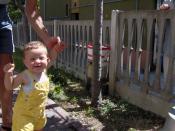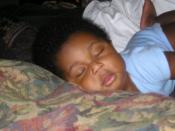How Does a Child's Acquisition of Language Typically Proceed from the First Birthday Onwards?
In the first four to five years of life, a human will learn how to articulate most of the sounds of English speech and acquire the ability to produce correctly structured sentences, take part in spoken dialogue and use language in order to learn, express emotions and to make personal contact. To achieve this, however, the child must go through the three basic stages of learning and understanding - the holophrastic stage, two-word stage and telegraphic stage. Each stage develops the child's linguistic ability until speech is fully developed and the child is able communicate adequately with adults and participate in conversation.
Until a child's first birthday, it cannot speak and so can only express emotions or state what it wants through crying (from birth), cooing / mewing (from six weeks) and babbling (only present from six months).
From the age of six months babies may stumble across certain words that sound like adult language, however, this is generally a coincidence, as a child only begins to realize that sounds are labels for things from approximately one year old. The first sign that a child is beginning to acquire language is when it begins to make sounds that can be linked to phonemes used by their parents and with which they associate certain meanings.
From one year old, the child becomes conscious of the fact that words are used to indicate objects, and so enters what is known as the holophrastic stage. Holophrastic, meaning 'of or relating to the stage of child language development characterized by the use of single-word utterances', is the stage in which the child first attempts to verbally communicate with others. By this point, children are generally able to recognise some of...


